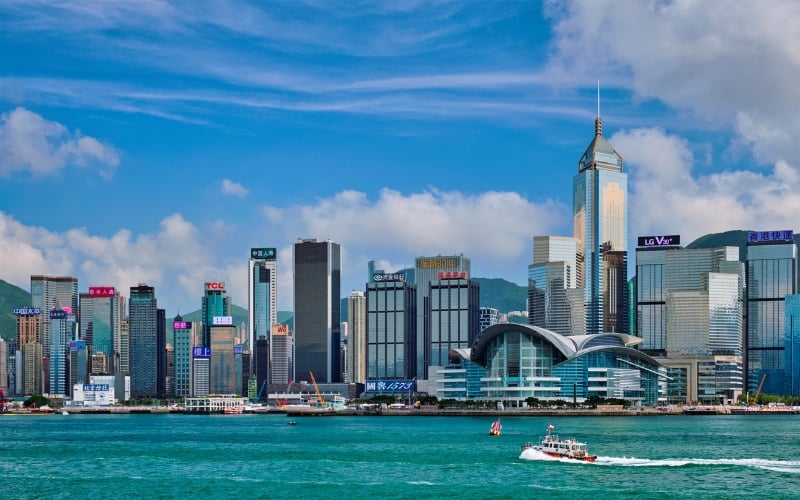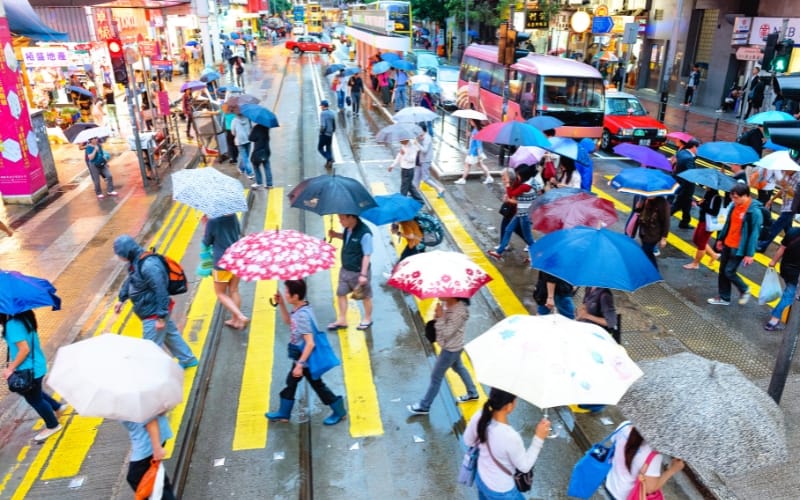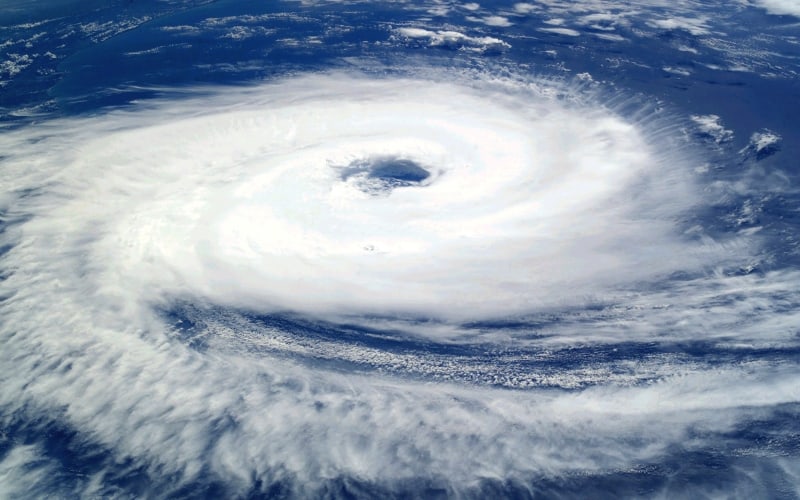Moving or visiting Hong Kong and wondering about the weather? Here’s everything you need to know from humid summers to ‘chilly’ winters and surviving typhoons…
Situated along the southeastern edge of China, Hong Kong is a city that captivates visitors, with its towering skyscrapers, bustling streets and vibrant culture. Yet, beyond the skyline and lively streets, there is another element that plays a significant role in the city’s appeal – its climate.
Hong Kong’s climate varies hugely, offering a unique blend of everything that makes up a subtropical experience. From scorching summers to cool, crisp winters, understanding the intricacies of Hong Kong’s climate is key. Regardless of whether you are moving to Hong Kong for work, or because you crave a change of scenery, it’s important to understand what to expect in terms of the weather. After all, the climate in Hong Kong is vastly different to what we are used to in the UK.
Below, we have taken a look at the four distinct seasons in Hong Kong, the impact of typhoons, and the regional variations.
What to Expect from Hong Kong’s Seasons

While it doesn’t not have the traditional four season cycle that some countries do, the climate in Hong Kong offers a unique blend of weather patterns throughout the year.
The weather in Hong Kong ranges from the blooming beauty of spring to the scorching heat of summer, from the comfortable days of autumn to the mild chill of winter.
Summer (June – August)
When you move to Hong Kong, summer is likely to be the hardest season to get used to. Summer in Hong Kong is hot, humid and often marked by typhoons. You can expect high temperatures averaging between 30 and 32°C and extremely high humidity levels, which can make the heat feel even hotter. Summer is also the wettest time of year in Hong Kong, and frequent heavy rain and thunderstorms should be expected, especially in July and August.
Typhoons are a common occurrence between June and August, which can cause disruptions.
Though the summer in Hong Kong can be challenging, it’s a great time for beachgoers and water sports enthusiasts to visit the area, who can enjoy the warm waters of the sea.
Autumn (September – November)
A lot of people think that autumn is the best time to visit Hong Kong, and it’s easy to see why. Between September and November, Hong Kong experiences pleasant weather and clear skies. The temperature begins cooling down from the summer heat, with average temperatures ranging from 25°C in September to 20°C in November.
Autumn is also the time that humidity levels decrease, making the weather more comfortable.
You can expect occasional rain between September and November, but autumn does tend to be drier than the summer months. Autumn is a popular season for outdoor activities, hiking and exploring Hong Kong’s beautiful natural landscapes.
Winter (December – February)
Compared to a lot of places, winter in Hong Kong is relatively mild, but it can still be chilly at times. Average temperatures in the winter range from 15°C in December to 18°C in February.
You can also expect lower humidity levels between December and February, which makes the weather feel crisp and refreshing.
However, it can often still be warm enough to enough an outdoor picnic or barbeque on Christmas Day!
Hong Kong is generally dry during the winter months, with only occasional light rain. While the winter is not freezing by any means, warm clothing might be needed, especially if you plan to explore the city in the evenings.
Spring (March – May)
There is something special about Hong Kong in the spring. Spring in Hong Kong is a delightful season, it’s a time when the city transitions from the cooler months of winter to warmer days. You can expect a comfortable temperature of between 17°C in March to 26°C in May, meaning that it’s warm but without being too warm. Spring is also the time of year when the humidity levels gradually increase, but it’s still relatively comfortable compared to the summer months.
Hong Kong does experience occasional rain in the springtime and thunderstorms are common, especially in May. However, it’s not as wet as the summer, and you can expect most days to be dry. Spring is an excellent time to visit Hong Kong as the city is lush and green, with blooming flowers and pleasant weather for outdoor activities.
Understanding the seasons in Hong Kong can help you plan your move abroad to the vibrant and dynamic city, ensuring you make the most of your time there, regardless of the weather. Whether you are hoping to get stuck into outdoor adventures, cultural experiences, or you simply want to explore living somewhere new, Hong Kong has something to offer in every season.
Hong Kong’s Climate Varies Slightly by Region
Hong Kong is a region with diverse landscapes and nature, which can lead to variations in weather conditions across different areas. While the overall climate remains subtropical, you can expect varying weather as you move from region to region.
For more information, check out our article about “Where to live in Hong Kong“.

Hong Kong Island
In Hong Kong Island’s Central District, which is located on the northern shore of Hong Kong Island, you can expect a typical urban subtropical climate. Summers are hot and humid, while winters are milder. Rainfall is fairly evenly distributed throughout the year, with occasional typhoons in summer.
In the southern district of Hong Kong Island, you can expect the climate to be slightly cooler. This is due to its proximity to the sea. It’s known for its beautiful beaches and is a popular destination for water sports enthusiasts.
Kowloon Peninsula
In Tsim Sha Tsui, located on the southern tip of the Kowloon Peninsula, you can expect a climate similar to that of Hong Kong Island’s Central District. It can get quite hot in the summer, and humidity levels are high. If you head to Mong Kok, you will likely feel even hotter in the summer due to urban heat effects. Winters are slightly cooler, but still mild compared to many other regions.
New Territories
Located in the eastern part of the New Territories, Sha Tin is known for its hot summers and cooler, more pleasant winters. It’s also home to beautiful parks and the Shing Mun River, and the climate is ideal for exploring these. On the western side of the New Territories, Tuen Mun experiences similar weather to Sha Tin, but it can be windier due to its proximity to the coast.
Outlying Islands
Lantau Island is home to Hong Kong International Airport, and it tends to be a bit cooler and less crowded than the city centre. It’s a popular destination for hiking and outdoor activities, and the climate allows for this. However, it’s important to remember that sudden weather changes can occur during typhoon season. Cheung Chau is a small island and it’s known for its fishing culture and seafood restaurants. It experiences a subtropical climate similar to the rest of Hong Kong but with a more relaxed atmosphere.

If you are contemplating a move to Hong Kong, it’s essential to be aware of one of the region’s significant weather phenomena – typhoons. Hong Kong is prone to typhoons during the summer and early autumn months, so you are bound to be impacted at one point or another. These powerful tropical storms can bring heavy rainfall, strong winds and, occasionally, flooding and landslides.
Though Hong Kong has an impressive system in place for typhoon warnings, to ensure that everyone is prepared, it’s crucial to stay informed and have a typhoon plan in place, especially if you are new to the area. Being aware of typhoon seasons and having the necessary supplies and plans can help you navigate this aspect of Hong Kong’s climate, ensuring your safety and comfort in your new home.
Useful tips for coping with the weather and climate in Hong Kong
Here are some useful tips for coping with the climate in Hong Kong:
- Embrace the AC: Air conditioning is ubiquitous in Hong Kong, from public transportation to offices and homes. Always have a lightweight sweater or cardigan as indoor areas can get quite cold due to the AC!
- Umbrellas are Essential: Whether for sudden rain showers or as a shield against the sun, always carry a compact umbrella.
- Stay Hydrated: The humidity and heat, especially during the summer months, can be exhausting. Drink plenty of water throughout the day.
- Lightweight and Breathable Clothing: Opt for clothes made of natural fabrics like cotton or linen, as these allow your skin to breathe and help wick away sweat.
- Sun Protection: The sun can be particularly strong. Use a good quality sunscreen, wear sunglasses, and consider hats or caps when venturing outside.
- Stay Informed During Typhoon Season: Typhoon season typically runs from May to early November. Familiarize yourself with the typhoon warning system and always follow the advice of local authorities.
- Mould Prevention: The high humidity can lead to mould growth in homes. Invest in dehumidifiers, regularly check corners, closets, and behind furniture, and use moisture-absorbing products.
- Footwear: Due to frequent rain showers, consider waterproof shoes or sandals that can dry quickly. Having multiple pairs to rotate is also beneficial.
- Weather Apps: Keep a weather app on your phone to monitor daily conditions, especially during typhoon season.
- Adapt Slowly: If you’re not used to high humidity and heat, don’t push yourself too hard at first. Your body will take time to acclimatize.
- Seek Out Nature: While the city can become stiflingly hot, Hong Kong offers numerous hiking trails, beaches, and parks where the breeze and greenery can provide some relief.
- Indoor Activities: On particularly hot or rainy days, consider indoor activities. Hong Kong has numerous malls, museums, theaters, and indoor recreational areas.
- Stay Positive: While the climate might be a significant change from the UK, try to embrace the unique aspects of Hong Kong’s weather. Enjoy the warmer winters and the opportunity to indulge in different seasonal activities.
Planning Your Move to Hong Kong

One of the most important aspects of planning a move to Hong Kong is organising how to get your belongings from A to B, and that is where we come in.
At United International Removals, we provide a whole host of removals services, and this includes helping people move to Hong Kong. You can look forward to your move, knowing that your prized possessions are safely on their way to your new home.
Every year we help many move to Hong Kong including both expats and returning Hong Kong residents. To find out more visit check out our guide on international removals to Hong Kong from the UK or click here to get a quote online.
